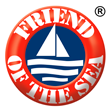First labelled products out in Switzerland and worldwide with the Friend of the Sea logo.
One more tuna fishery and several branded tuna products obtain the Friend of the Sea recognition. Following the certification of the Azorean pole and line skipjack tuna fishery in 2006, now the Sri Lanka deepwater ‘short-lines’ fishery for yellowfin tuna has been found compliant with Friend of the Sea’s sustainability criteria. Tuna from Sri Lanka’s Global Sea Foods and Decatrading and sushi tuna from the Swiss producer Covedis and retailer Manor, have been certified Friend of the Sea.
Yellowfin tuna in the Indian Ocean is considered not overexploited by FAO (Global Status of Tuna & Tuna like Species, 2007). The fishery assessed is composed of vessels up to 11 meters in length, deploying an average of 500 hooks per line and operating short 7 days trips. These small vessels “short-lines” fish at depths of 150 meters. Discards are less than 1% as the fishery is much more selective than alternative gillnets and the catch is loaded onboard alive. Tuna catches represent up to 90 percent of total catch, depending on the fishing season. The rest of the catches comprise mainly of swordfish, while the small shark catch represents an ‘insignificant’ relative contribution to the total shark catch in the area (“Management of Shark Fisheries in Sri Lanka”, Ministry of Fisheries and Aquatic Resources Development).
An onsite audit by an international independent certification body was run at the fishery, verifying the fishing method, discards composition, compliance with national regulation and traceability up to the finished product. All future companies’ procurements will be monitored independently for traceability via documental evidence and periodical on-site spot-checks.
“Consumers and buyers should be informed that longliners selectivity can be strongly increased by optimizing factors such as bait species, fishing depth, time of deployment and hooks” comments Dr Paolo Bray, director of Friend of the Sea “Sri Lanka deepwater short lines are selective in species and size and can represent an important alternative to higher impact fishing methods for tuna, such as gillnets. Last but not least, the Friend of the Sea certified tuna comes from producers which are being certified also as Dolphin-Safe.”



